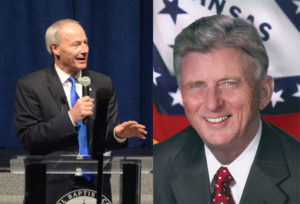
© 2016 by Steve Brawner Communications, Inc.
No two individuals are alike. This past week was a reminder of how that’s the case with Gov. Asa Hutchinson and his predecessor, Gov. Mike Beebe.
Hutchinson called legislators to Little Rock to raise $50 million to make the state eligible for $200 million in federal highway funds each of the next five years. His bill did that by relying largely on surplus funds and interest income, which some legislators thought was the wrong way and/or not enough. It was over in three days, and while it was probably inevitable that the governor’s bill would pass, it wasn’t always easy.
This was the second special session this spring. This first was to pass Arkansas Works, the program that uses federal Medicaid dollars to purchase private health insurance for adults with incomes up to 138 percent of the federal poverty level.
Hutchinson has been in office about 16 months and has called three special sessions. In eight years, Beebe called only three special sessions, though two were in his last 15 months in office.
That’s one big difference. Another is this past session included 15 items. That’s not particularly large by historical standards; then-Gov. Bill Clinton once called a special session with 285. However, Beebe’s three sessions combined had only 17 items.
The other big difference is in Hutchinson’s and Beebe’s approach. Beebe, who became governor after a long legislative career, didn’t call lawmakers to Little Rock until the bills were written and the votes counted. Everything was largely done behind closed doors, and then legislators voted and went home.
In contrast, during this past highway session, the actual bill wasn’t filed until legislators were arriving in Little Rock, leading Sen. Bryan King, R-Green Forest, to tell the Arkansas Democrat-Gazette, “There have been as many Bigfoot sightings in the past 20 years as there have been of the final draft of the governor’s highway bill over the last week.” The bill failed to pass the Senate Transportation Committee, which meant the sponsor, Sen. Bart Hester, R-Cave Springs, had to move it to another, friendlier one.
Eventually it passed, and Hutchinson signed it into law on the session’s third day, which is as quickly as he’s allowed under the Arkansas Constitution.
Is one governor’s approach better than the other? Let’s just say they’re different. It’s probably true that the highway session was messier under Hutchinson than it would have been under Beebe – in public. Under Beebe, the messiness would have happened earlier, in private.
You could make the case that Beebe’s way is more efficient and that Hutchinson’s is more transparent. Under Beebe, legislators came to Little Rock for very specific purposes and then left, which is good in that it meant they weren’t debating a bunch of bills that were better left for a regular session. With Hutchinson, the process was more open and visible – the debate occurring on the Senate floor and in committee hearings in addition to back rooms.
Meanwhile, the two governors have operated under different circumstances. Beebe led a Legislature that was full of not particularly committed Democrats when he entered office who were replaced by Republicans by the time he left. Hutchinson leads a fractious Republican caucus with a Democratic minority that’s trying to figure out how to assert itself. For a variety of reasons, maybe Beebe had to work things out beforehand, and maybe Hutchinson can’t.
There was some grumbling among legislators about this session’s disorganization. When I asked Hutchinson why, unlike Beebe, he didn’t have all his ducks in a row, he said lawmakers needed the pressure of a session.
“What’s the objective in life?” he asked. “Is it to accomplish significant legislative action, or is to to get things done in a cookie-cutter fashion where the outcome is known before you start? While you like to do all your homework in advance, the fact is, if I would have insisted upon, ‘Everybody sign on to the highway plan before we start,’ we’d never got it done.”
I took that as a defense of his own approach, not a criticism of Beebe’s. They govern in different circumstances, and no two individuals are alike.
The other bills, (I think about 17) were shared among Republicans and the votes were assured before the session. Also, one of these bills was 89 pages long and sent out in the call only two days before the session. This was the one on government efficiency. What I see in that bill is moving more items, such as the task force on autism, into
control of commissions that are appointed by the Gov. Another bill was 80 pages long
As one house member said, “Show me a bill that is over 10 pages long and I will show you a bill that has something to hide.” Look for more of the same for this administration.
And frankly, I prefer Beebe’s method to Hutchinson’s.
Well, this is interesting – two of my high school English teachers commenting on the same post! I am NOT going to get into an argument on this one. : )
The government efficiency bill ended up growing to 105 pages when the History Commission part was added. I think the final version arrived the day the session started. Sen. Flowers gave a pretty good speech against it.
Steve, is there some irony in the “efficiency” bill’s 105 pages? Do legislators understand irony?